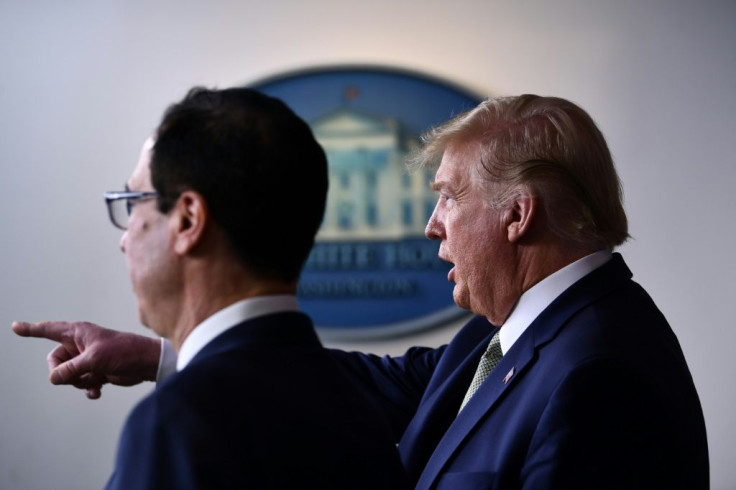Could The US Government Take Equity Stakes In Coronavirus-Stricken Companies It Bails Out?

KEY POINTS
- The government said it ultimately lost $11.2 billion in the GM bailout
- Airlines now asking for $50 billion bailout
- In 2008, the government rescued AIG with an $85 billion bailout
President Donald Trump said on Thursday that he would not oppose the federal government securing equity stakes in companies which accept federal bailout money designed to curb the economic impact of the coronavirus outbreak.
Trump said the government will likely offer financial aid to the airlines, hotel and cruise line industries.
“You don't want to lose industries like this. These are incredible industries, you can't lose them,” Trump said.
U.S. Treasury Secretary Steven Mnuchin also was not averse to the idea of the government taking equity stakes in exchange for the financial aid.
“As it relates to the big companies like the airlines, we’re looking at making secured loans on market terms. So, you know, we’ll see whether that includes equity or doesn’t include equity, and again, we’re not going to force things on people,” he said.
Mnuchin added that the Trump administration will “make sure that the taxpayers are compensated fairly.”
On Wednesday, White House economic adviser Larry Kudlow also supported the idea of the government taking equity stakes.
However, an equity stake held by the government may not be to a corporation’s liking since such a measure usually is dilutive to other shareholders and gives the government more say in how a company is run. In addition, taxpayers sometimes get stiffed on bailouts.
For example, the U.S. government received a 61% equity stake in General Motors (GM) when the car giant was granted a $50 billion bailout in 2009. The government said it ultimately lost $11.2 billion in the deal, while GM returned to profitability.
“The goal of [the U.S.] Treasury’s investment in GM was never to make a profit, but to help save the American auto industry, and by any measure that effort was successful,” Treasury Department spokesman Adam Hodge said at the time.
Critics of the bailout said the deal should have been arranged so that a percentage of GM’s future profits would be used to repay taxpayers.
"We're certainly glad they're making a profit now, but it would have been nice if there had been clawback provisions to make taxpayers whole," said Scott Hagerstrom, Michigan state director of the Americans for Prosperity, a public interest group opposed to government spending.
Now U.S. airlines are seeking $50 billion in federal aid to stave off bankruptcies; however they are likely to want that cash in the form of direct grants and loans – rather than through an exchange of equity for cash.
Trump also said he would not want companies that receive bailouts engaging in stock buybacks or paying out executive bonuses.
“We don’t want that,” Trump said Thursday. “Some companies, as you know, did stock buybacks. It’s very hard to tell them not to, but I would tell them not to. People [companies] are coming in for money, in some cases [through] no fault of their own but in some cases where they did certain things over the course of the years including buying back stock.”
Moreover, some of Trump’s Republican allies cringe at the very thought of “bailouts” for distressed companies.
For example, U.S. Senate Majority Leader Mitch McConnell said on Thursday that federal aid to airlines would be “loans” that will have to be repaid rather than a “bailout” per se.
“We’re not calling about so-called bailouts for firms that made reckless decisions,” McConnell said. “We’re not talking about a taxpayer-funded cushion for companies that made mistakes. We’re talking about loans which must be repaid.”
Byron Callan, managing director of Capital Alpha, said the government obtaining equity stakes in airlines were a possible outcome of this scenario.
“We are in unprecedented territory so anything is possible and it’s prudent to consider all tools that could be used,” Callan said. “The U.S. government buying direct equity stakes may seem extreme but if it keeps a national airline system afloat, it’s conceivable.”
Perhaps the most controversial bailout from the 2008-2009 financial crisis involved insurance giant American International Group (AIG), which posted huge losses and was on brink of collapse.
On Sept. 16, 2008, the government rescued AIG with an $85 billion bailout – but that figure eventually ballooned to $182 billion. The U.S. Treasury initially gained an 80% stake in AIG.
Although the government, i.e., the taxpayers, eventually made about $22.7 billion on the deal, AIG was widely criticized for using some of the bailout funds to pay large bonuses to executives, some of whom were responsible for the company’s near-bankruptcy in the first place.
© Copyright IBTimes 2024. All rights reserved.





















